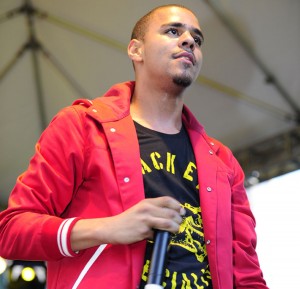Rapper J. Cole returns to true form, impresses in newest album
In the minds of hip-hop aficionados, up-and-coming rapper J. Cole’s decision to move up the release date of his sophomore album Born Sinner to the same day as Kanye West’s highly anticipated Yeezus was tantamount to career suicide. Hip-hop is an unusually competitive musical genre that is artistically governed by the collision of personas and egos — even if, at times, those collisions are inadvertent.

Work at it · J. Cole enjoyed commercial success with “Work Out” from his debut album, but has amassed critical acclaim for his newest album. – Courtesty of Creative Commons
These collisions and their marketing machinations also manifest in the seemingly all-important realm of first-week album sales. In moving up the release date of his album to June 18, Cole was not attempting to challenge West directly, but to make a bold statement of his arrival as an artist, and the rapper’s viability to compete with established artists such as West.
It was a risky move on the part of Cole because his major label debut, 2011’s Cole World: The Sideline Story, was a false start. An uninspired mélange of attempted radio-friendly singles and incongruous production, the album showed promise but ultimately failed to deliver on the hype generated by Cole’s more highly touted mixtape efforts, including 2009’s The Warm Up and 2010’s Friday Night Lights. If Born Sinner had amounted to simply Sideline Story II, the predictions of career suicide would have read more like prophecy.
Instead, the Roc Nation signee returns to the formula that made his mixtapes so famous — an uncanny knack for tight, sample-heavy production paired with a fierce lyrical delivery dripping with the hunger of a rapper on the cusp of success. Cole takes these elements and glosses the proceedings with a polish worthy of a studio release.
“Allow me to reintroduce myself, my name is Cole,” barks the Fayetteville, North Carolina native, channeling the words of his boss and mentor Jay-Z. It’s the last line from the album’s intro “Villuminati,” in which a tempest of strings is tamed by thumping bass drum kicks and a string bass rendition of the opening of DJ E-Z Rock and Rob Base’s “It Takes Two.” The production is as sweeping and epic as anything in hip-hop since Kendrick Lamar’s good kid, m.A.A.d. city.
The intro sets a darker tone for the album — a contrast to the brighter, pop-appealing efforts off Sideline Story like the single “Work Out.” While the catchy Paula Abdul-sampling affair led to Cole’s most successful single to date, the response to the song’s pop-friendly affectations was less appreciated in hip-hop purist’s circles.
One such critic was hip-hop legend Nas, whose acerbic reaction to Cole’s pop-friendly compromise was the subject of highlight track “Let Nas Down.” A jazzy, contorting alto saxophone refrain lays effortlessly over boom-bap drums as Cole recalls hearing the news of his idol’s disapproval: “Dion [producer No I.D.] called me when it dropped sounded sad but sincere / Told me ‘Nas heard your single and he hate that sh-t’ / Said ‘You the one yo, why you make that sh-t?’”
As if in response to the criticism, the singles on Born Sinner showcase Cole’s potential to craft thought-provoking singles with wider appeal, as opposed to his previous painful pop-pandering acrobatics. “Power Trip” and “Crooked Smile” are relatively complex treatments of love; the former is a man’s reconciliation with his moral shortcomings on account of his feelings for a woman, and the latter is an uplifting track that urges listeners to love themselves and celebrate their individuality.
The lyrical content of Born Sinner sees Cole attempt to reconcile the persona of a stereotypically successful rapper with deeply rooted Christian conceptions of personal morality. This dichotomy often manifests in his interactions with the familiar rap archetypes — for instance, the rejection of the silver-tongued stripper in “She Knows,” or justifying the purchase of a blinged-out Jesus chain in “Chaining Day.”
Many of these tracks dually function as metaphors for his relationship with his craft: how the seductive allure of fame and material wealth (in the form of becoming a radio-friendly hit-maker) is ultimately outweighed by a greater need to make music that is true to his original vision. Cole is the ultimate hip-hop purist, insofar that he equates the honesty of his musical expressions to a moral ideal. In these respects, Born Sinner seems almost desperate to prove Cole hasn’t sold out.
The first week tallies are in: according to Hits Daily Double, Yeezus sold 328,800 units, edging out Born Sinner, which had 297,922. The stakes were decidedly lower than in 2007, but the statement is clear: that despite Kanye’s genre-challenging genius and overwhelming celebrity hype, sometimes it’s the comfort of honest, well-crafted music of albums like Born Sinner that are capable of generating just as much anticipation. The tally at the very least confirms that J. Cole is more than just a one-and-done, so hip-hop fans should take comfort in the fact that Born Sinner is selling — and not selling out.
